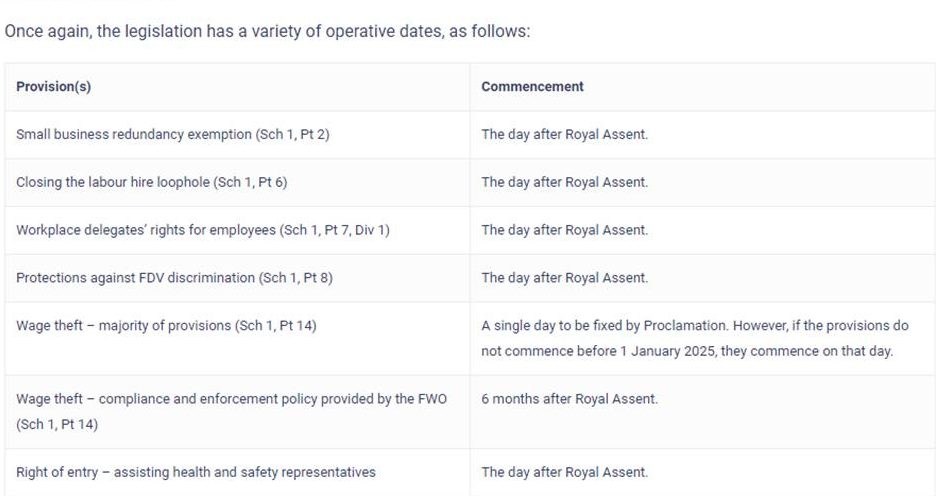Recent Developments:
The Federal Government, in collaboration with the Greens and cross-bench senators, has effectively split the Fair Work Legislation Amendment (Closing Loopholes) Bill 2023. This strategic division resulted in the first part of the bill being passed.
In summary, some of the key changes include:
- ‘same job, same pay’ orders for labour hire workers
- the introduction of the federal criminal offence – ‘wage theft’
- restrictions to small business redundancy exemptions
- Federal Industrial manslaughter laws
- increased union delegate rights; and
- strengthening discrimination protections for family and domestic violence victims.
Royal Assent for the bill was made on 14 December 2023 for the Fair Work Legislation Amendment (Closing Loopholes) Act 2023.
Key Elements for HR to Note:
Labour Hire Reforms – Same Job, Same Pay
The Act now allows for the Fair Work Commission (FWC) to make a ‘regulated labour hire arrangement order’ (RLHA Order). This requires a labour hire provider to pay at minimum an equivalent rate of pay as the host business’s own employees for performing ‘the same’ work.
To receive the same pay as set out under the Act, a labour hire employee must apply for a RLHA Order in the FWC. The FWC may then grant or deny the application after considering whether:
- an employer supplies, or will supply one or more of its employees (directly or indirectly) to perform work for a host organisation; and
- the host business is covered by an enterprise agreement, a workplace determination or a public service determination that would apply to the labour hire employees if they were directly employed by the host to perform ‘the same’ work.
Relevantly, the FWC will not grant an order if it determines if the work performed under the labour hire arrangement is for the provision of a service as opposed to a supply of labour.
There are several factors to decide if it is a provision of a service:
- the specialised or expert nature of the services,
- the level of control the employee has and
- the access to host systems, plant, equipment, or structures
There are limited exemptions available to labour-hire employers, namely where:
- the labour hire arrangements is for 3 months or less – which will therefore exclude surge or temporary work; or
- the employer is a small (labour hire) business. Small businesses are those with less than 15 employees.
Wage Theft
Wage theft laws similar to those already seen in Victoria and Queensland are set to be rolled out nationwide. In particular, the new wage theft laws are geared to target the intentional underpayments of wages and superannuation by companies and responsible individuals.
If found guilty, offending corporations are liable to incur a hefty fine of (whichever is the greater amount):
- three (3) x underpayment amount; or
- a $7,825,000 fine.
Offending individuals will also be personally liable and may face:
- up to a $1,565,000 fine; or
- maximum 10 years imprisonment.
Fortunately, the introduction of the ‘Voluntary Small Business Wage Compliance Code’ (Compliance Code) provides a level of protection to employers. If the Fair Work Ombudsman (FWO) is satisfied that an employer has complied with the Compliance Code following an underpayment, they will be unable to pursue further regulatory action.
These changes are set to come into effect on 1 January 2025, or a date earlier as fixed by Proclamation.
Industrial Manslaughter
The updated legislation introduces criminal charges for industrial manslaughter, aligning federal occupational health and safety (OHS) laws with those in many states and territories.
Under these changes, federal public servants accountable for a worker’s death could face imprisonment of up to 25 years.
Additionally, Commonwealth departments might incur fines as high as $18 million. The revisions also elevate the maximum penalties for a category one offenses in the federal OHS laws, which involve reckless or criminally negligent violations, to $15 million in fines and up to 15 years of imprisonment. The new industrial manslaughter provisions will commence on 1 July 2024.
Rights for Union Delegates
Under the new regulations, employers, except small businesses, must permit workplace delegates to participate in paid training relevant to their role during regular work hours without any loss of pay.
The new laws also set forth restrictions on employers, including:
- Prohibiting unreasonable refusal or failure to interact with a workplace delegate.
- Banning knowingly or recklessly making false or misleading statements to a workplace delegate.
- Forbidding any unreasonable actions that hinder, obstruct, or prevent a workplace delegate from exercising their rights.
Non-compliance with these provisions can lead to financial penalties under the Fair Work Act 2009 (Cth).
These changes are now in effect.
Starting from 1 July 2024, modern awards, enterprise agreements, and workplace determinations are required to incorporate a ‘delegates rights’ clause that mirrors these stipulations. This clause will be applicable to enterprise agreements voted on from 1 July 2024 onwards and does not necessitate amendments to existing enterprise agreements.
Redundancy and Small Business
Relevantly, section 121(1) of the Fair Work Act exempts small businesses from the obligation to pay redundancy pay. However, the current section 121(1)(b) creates a loophole that allows larger employers to avoid paying redundancy pay if they downsize due to insolvency, and the number of employees falls below 15 (the threshold for a small business employer).
To address this issue, the new law introduces a new subsection that will close this loophole by specifying that redundancy is still owed in circumstances where an employer becomes a small business employer following termination of employment resulting from bankruptcy or liquidation.
This change is now in effect.
Further Discrimination Protections
The new law also seeks to provide strengthened protection for employees who are subject to family and domestic violence. As such, family and domestic violence are to be added as a protected attribute under the FW Act, shielding current and prospective employees from adverse action resulting from any domestic violence experienced. This will come into play in General Protections claims
Future Developments
The second part of the bill, dubbed Closing Loopholes Bill No. 2, is slated for 2024. It will address gig economy regulations, road transport, casual employment conversion, and additional bargaining regime modifications.
Immediate Actions and solutions for HR:
- Implementation Timeline: The labour hire provisions are set to commence upon the bill’s assent, superseding the initially planned date of July 1, 2024. However, Fair Work Commission orders related to ‘same job, same pay’ cannot start before November 1, 2024.
- Preparation for New Laws: HR teams should anticipate union applications once the laws take effect and prepare for potential claims in bargaining contexts influenced by these new regulations.
- Labour Hire: If you are a Labour Hire Employer be prepared for a regulated labour hire arrangement order – what will need be considered to combat the application is whether an exemption applies or that the supply of labour is for a provision of service. Advice should be sought well in advance to give some clarification for what could be utilised (or even changed) to comply with an exemption or come under a provision of service – with a review undertaken to mitigate liability and risk.
- Wage theft – This is the time for employers to undertake wage audits. Even sample wage audits will suffice. With so many changes to modern awards in recent years there are probably going to be issues with employment contracts, pay structures and individual flexibility arrangements. In particular with automated pay systems and brand name companies such as Woolworths been caught out this is a good time to get the payroll house in order. NB Employment Law can help read more here.
- Industrial Manslaughter – With increased health and safety regulations, an active step to take is due diligence workplace health and safety training. The NB Employment Law team undertook quite a number of WHS training workshops which received very positive feedback. You can read more here.
- Union Delegate rights – Employers who have strong union representation in workplaces need to avail themselves of the new changes, namely that union delegates have the ability to access paid training and prohibiting interactions with a workplace delegate. Management training on these new rights should be part of the early 2024 training schedule – this is something the NB Employment team can help with. You can read more here.
- Redundancy Pay and small business – insolvency practitioners and accountants in particular should be aware of these changes. Advice should be sought by NB Employment Law before advising on redundancies in these circumstances.
- Further Discrimination provisions for family and domestic violence – paid domestic violence is already in place. Expect to see General Protections claims enlivened much more in this area and managers should be very carefully trained on dealing with family and domestic violence disclosures by employees under their management.
Commencement Dates:

What’s Next?
The Closing Loopholes Bill No. 2 remains under Senate consideration, with a report from the Senate Education and Employment Legislation Committee expected by February 1, 2024. This bill’s focus will be on the remaining provisions not covered in the first part.
At NB Employment Law (formerly NB Lawyers), our employment lawyers Brisbane team offers an obligation-free consultation to deal with these types of matters – for employment law advice call us on +61 (07) 3876 5111 to arrange a consultation to discuss your inquiries and we will do our best to provide a helpful, practical solution
Written By
Director
About the Author
Jonathan Mamaril , Australia’s trusted and leading employment lawyer with over a decade of experience.
Jonathan leads a team of handpicked experts in the area of employment law who focus on educating clients to avoid headaches, provide advice on issues before they fester and when action needs to be taken and there is a problem mitigate risk and liability. With a core value of helping first and providing practical advice, Jonathan is a sought after advisor to a number of Employers and as a speaker for forums and seminars where his expertise is invaluable as a leader in this area as a lawyer for employers.
Jonathan Bio Page
[email protected]
+61 (07) 3876 5111


